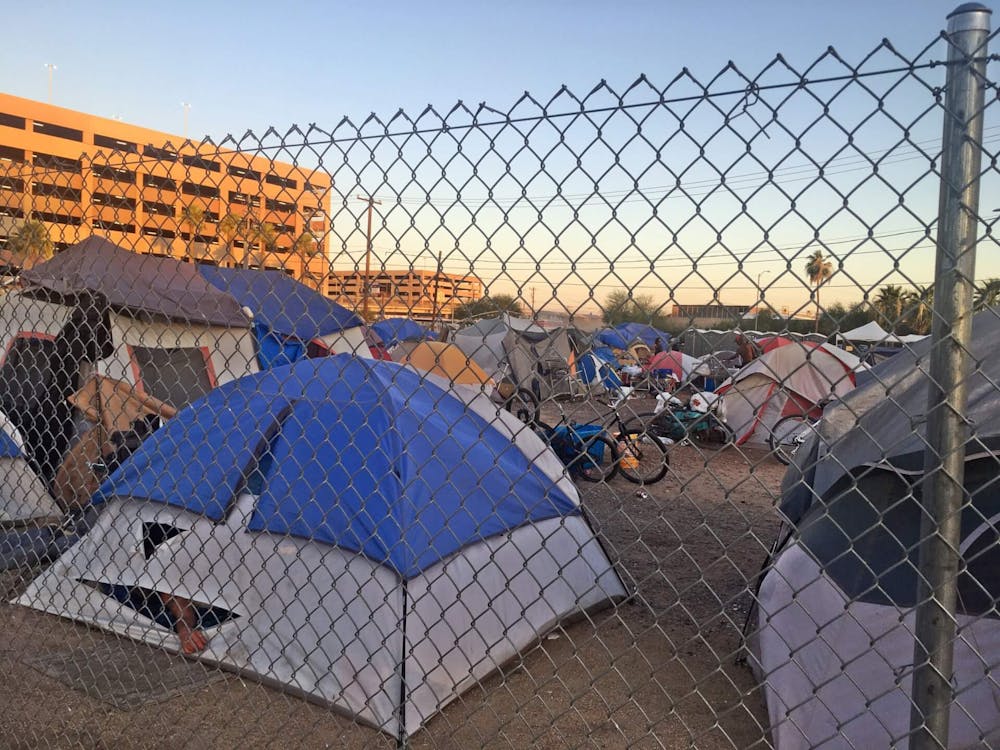Elizabeth Montgomery at just 18 years old was waiting in an Olive Garden parking lot, enviously watching people eat. Her only wish was to be able to sit in a booth and have food to eat too. Food was scarce. Montgomery would rummage through half-eaten or thrown out leftovers, trying to find enough substance to last the night. This is a common reality for individuals like Montgomery, who experienced homelessness for three years of her life.
According to the Arizona Department of Economic Security in 2022, roughly 13,553 individuals statewide are currently experiencing homelessness.
Montgomery had just graduated high school and had been accepted into Clayton State University. Then, her life fell apart.
“One afternoon, I got home from work, and my mom told me I couldn't come inside,” Montgomery said. “She snatched my key out the door and closed the door behind her. My brother screamed for my mom to let me back in, but that didn't help. I spent the night in the AMC Theater parking lot in my car.”
Montgomery would spend the next three years living out of her car or with people she met online.
Despite the living conditions, Montgomery managed to take enough classes at her community college to be a full-time student. Knowing that she had a passion for writing, Montgomery decided to pursue an English degree.
“Most of my days were either in a classroom or in my car, waiting for my next class to start,” she said. “The summer was the worst because I'd sit in my car, melting while trying to do my homework.”
Montgomery would spend the nights in her car, finding different Walmart or Kroger parking lots to camp out. The nights were often sleepless.
Homelessness looks different for everyone. Whether someone is living on the streets, on someone else's couch, or even in a car, no story is the same.
“All my clothes were packed into my trunk,” Montgomery said. “The rest of my life was in my backseat.”
Montgomery, to appease her restlessness, became a sex worker for some time in order to have a bed to sleep in. She would stay in hotels when she could scrape together the funds, and split time staying with a coworker and a family she met online.
Many young adults may not know about various resources available, such as shelters, soup kitchens, hydration stations and even churches.
“(I) didn't know about shelters or where to find them. I didn't find out about any programs the school offered or anything. I had no idea these things existed,” Montgomery said. “I was too worried about where I'd sleep and too afraid and ashamed to ask for help.”
Montgomery said she always thought of a shelter as an undesirable location, somewhere she didn’t want to go because of the social stigma. Instead, Montgomery spent time at her school, what she called her “safe space.”
According to a survey done by Phoenix Rescue Mission, 49% of people who identify themselves as homeless are sheltered, but 51% do not stay in a shelter. There are numerous shelters located across the valley, the Human Services Campus, a nonprofit Phoenix organization, being one of them.
Amy Schwabenlender, CEO of the Human Services Campus, explained how the campus is located between Phoenix City Hall and the State Capitol, where 15 nonprofit agencies provide services for individuals experiencing homelessness.
“The HSC-operated Brian Garcia Welcome Center on the campus is the first point of contact for individuals seeking services from campus partners and is where adult men and women are first assessed to determine how best to design individualized plans for them,” Schwabenlender said. “The ultimate goal is to move them from the streets into permanent housing.”
There are a total 900 beds on the campus, all of which are filled every night, Schwabenlender explained. Arizona residents can get involved in organizations like this by donating or volunteering.
Audrey Reeves, a senior nursing student at Arizona State University, volunteered at the Westward Ho, a low income housing facility focused on providing services to senior citizens and people who have disabilities.
“I had a great experience helping at the Westward Ho,” Reeves said.
While Reeves was there, she offered to take residents blood pressures or blood sugar readings. She explains the importance behind this as hypertension and diabetes are common, especially among those who stay at the Westward Ho due to risk factors like low socioeconomic status or older age.
“The residents I interacted with were very friendly and thanked us for being there. I enjoyed talking to everyone and felt very welcomed by the community.”

